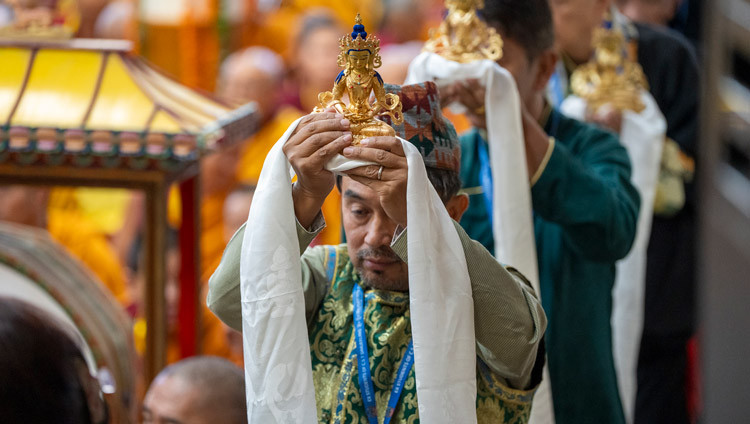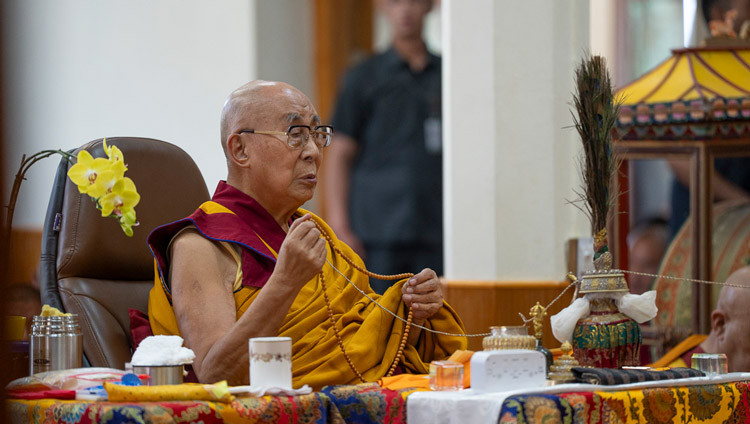Meeting Participants in a Conference about the Impact of Contemplative Practices
Thekchen Chöling, Dharamsala, HP, India – This morning His Holiness the Dalai Lama met 200 people from, or associated with, Emory University, who have come to Dharamsala to take part in a conference on the theme ‘Investigating the Impact of Contemplative Practices’. Executive Director of the Emory Compassion Center, Geshé Lobsang Tenzin Negi, introduced the occasion.

Executive Director of the Emory Compassion Center, Geshé Lobsang Tenzin Negi, introducing the program at the start of the meeting with His Holiness the Dalai Lama and participants in a conference about the impact of Contemplative studies at His Holiness’s residence in Dharamsala, HP, India on May 24, 2024. Photo by Tenzin Choejor
“Your Holiness, on behalf of everyone present I would like to express our gratitude to you for inviting us to this conference co-hosted by Emory University and the Dalai Lama Trust.
“Among us are Emory faculty, staff and students; Emory-Tibet Science Initiative (ETSI) students, teachers and staff; Tibetan teachers and students who are following Social, Emotional and Ethical Learning (SEE Learning) programs, as well as other observers and participants.
“For the first time, Tibetan monastic scholars who have systematically studied modern science are presenting the first outcomes of their research in the field of contemplative practice. This is an historic event, the fruit of your visionary introduction of science to the Tibetan monastic centers of learning about 20 years ago. Science has become an integral part of Tibetan monastic education. As a result of this education, monks and nuns are emerging as scientists.
“Before handing over to Dr Barbara Krauthammer, Dean of Emory College of Arts and Sciences, I’d like to introduce David Nassar, Vice-president of the Templeton Foundation and John Cunningham, Executive Director of the Templeton Foundation. We are grateful for their presence and the Foundation’s support of the ETSI Program over the last ten years.”
Dr Negi explained that Emory students who are studying Tibetan culture, Buddhist philosophy and the Buddhist science of mind; ETSI students and Tibetan school-children would each put a question to His Holiness.
On behalf of Emory University Dr Barbara Krauthammer thanked His Holiness for his vision and kindness.
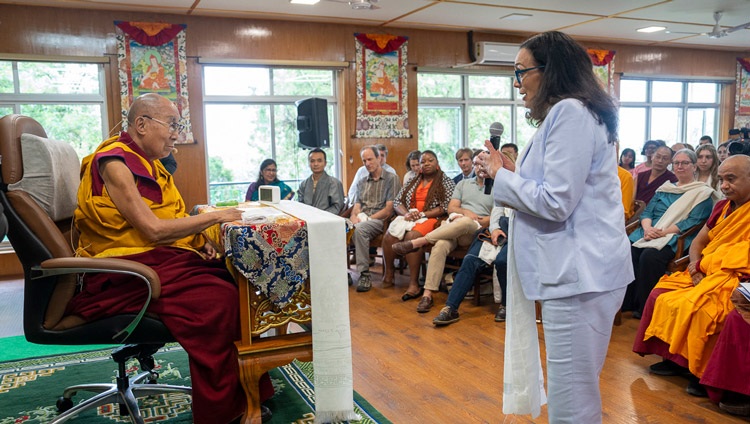
Barbara Krauthamer, Dean of Emory College of Arts and Sciences, thanking His Holiness the Dalai Lama for his vision and kindness during the meeting with participants of the conference about the impact of Contemplative studies, co-organized by Emory University and The Dalai Lama Trust, at his residence in Dharamsala, HP, India on May 24, 2024. Photo by Tenzin Choejor
“I have nothing special to say today,” His Holiness replied. “From our study of Buddhism, we have access to a great deal of information about psychology, the workings of the mind and emotions. When they talk about religion, people are generally referring to matters of faith not how to conduct an investigation. However, the Nalanda Tradition places emphasis on taking a critical, analytical approach, and its scholars are learned when it comes to the study of the mind.
“When the Indian master Shantarakshita came to Tibet in 8th century he recognized that Tibetans have an ability for deep thought. This was a measure of his kindness to us.
“I like to talk about secular ethics and what make them important is that they can be applied by anyone whether they are religious or not. The crucial issue is to discover how to achieve peace of mind. Buddhists also have to understand that what’s important is not the conduct of rituals, but whether we can endow others and ourselves with peace of mind. And the way to do this is by employing the mind.
“In the monastic curriculum we learn about the four Buddhist philosophical schools, but when we interact with other people it’s more practical to talk about how our mind and emotions work. This is something of common interest. The way we can help other people is to discuss how to relax and achieve peace of mind from a scientific point of view.
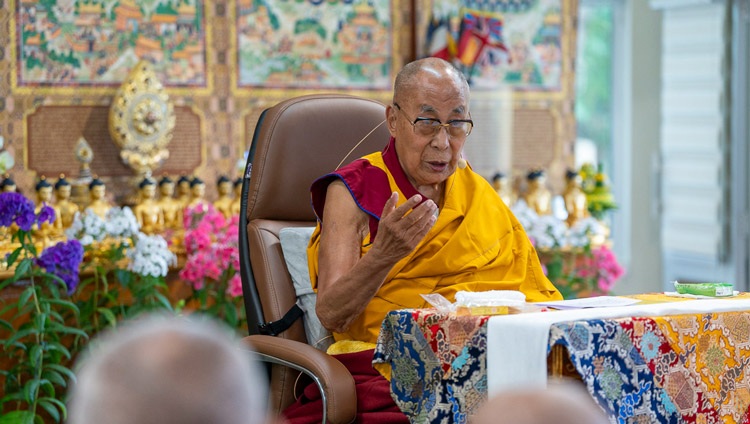
His Holiness the Dalai Lama addressing participants in a conference about the impact of Contemplative studies at his residence in Dharamsala, HP, India on May 24, 2024. Photo by Tenzin Choejor
An Emory University student asked His Holiness how to keep hope alive in our world today.
“A lot of the time,” His Holiness replied, “we have all sorts of expectations, but what we have to keep in mind is that bad as well as good things can happen. We have to use our intelligence to solve the problems we face. We have to examine what is really going on. Sometimes we may turn to religion in search of a solution, but much more effective is to employ our intelligence and our ability to reason.
“When we engage in formal debate in the monasteries, it’s customary for challengers to cite quotations from scripture to support their assertions. The defenders take off their hats to indicate their respect, but then reply that what has been cited is not logically necessary. Instead, they declare that what’s important is to employ our critical faculties.
“A scientific approach is an excellent tool for assessing the reality of any given situation. The Nalanda Tradition too teaches us how analyze and investigate without resort to scripture.”
A monk from the ETSI program asked how monastics who have studied science can contribute to society. His Holiness responded:
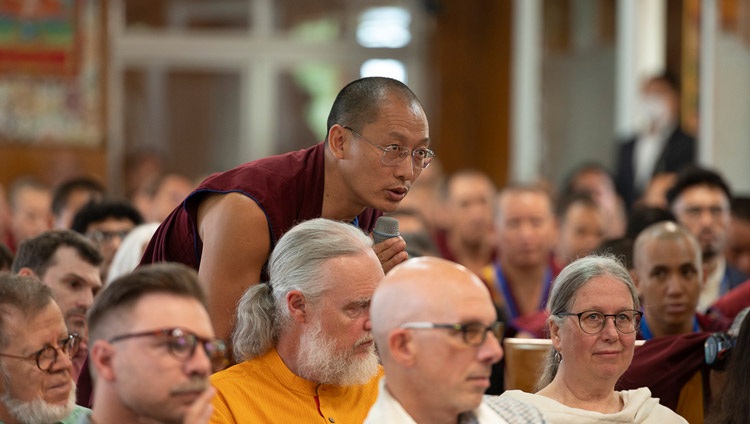
A monk from the ETSI program asking His Holiness the Dalai Lama a question during the meeing with participants in a conference about the impact of Contemplative studies at his residence in Dharamsala, HP, India on May 24, 2024. Photo by Ven Zamling Norbu
“The very purpose of studying is to be able to serve others better. As I’ve already said, we have to use our intelligence with reason and logic. Of course, there is a great deal we learn about the mind from reading books, but we must understand that we will learn more and in greater detail if we examine our minds in a scientific way.”
Noting that His Holiness is keen to encourage an appreciation of secular ethics and that their essence is compassion, a Tibetan Children’s Village (TCV) student asked what the nature of compassion is.
“Different traditions teach us how to be more considerate and well-mannered,” His Holiness told her, “but compassion in terms of active concern for others is the key issue. Secular ethics provides us with the means to guide society, but on a person-to-person level, what everyone appreciates is warm-heartedness.”
Two science books published by ETSI were presented to His Holiness. The visitors gathered in their various groups around him to have their photographs taken, and then they departed for the first session of their conference.



